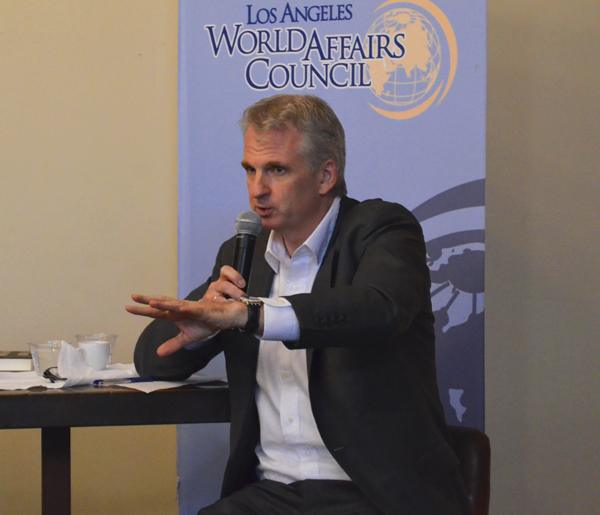
Timothy Snyder
In Vladimir Putin’s Russia nobody believes anything is true, the government has “weaponized distrust” and, said Yale history professor Timothy Snyder, the Kremlin systematically confronts the EU and the US because it distracts from the basic Russian problem which is too dark to mention: what will happen when Putin dies? Snyder, a Russia and Eastern Europe specialist, has dedicated much of his life to understanding Russia, and the picture he presents is of a country that Putin has brought to the edge of the abyss, with no long-term economic development plans and no space for any open discussion about the political future of the country.
“If we were having this discussion in Moscow right now, we would very quickly find ourselves on the floor with men pointing guns at us,” said Snyder. Speaking to a LAWAC Global Café breakfast, Snyder said that Russians don’t trust their own media, but they are constantly told that the foreign media is full of lies too, “so you might as well prefer our lies to their lies.” And although Russia expends enormous effort on its cyber campaign against the West, “their entire cyber budget costs less than one F-35 – which do you think changes the world more?”
Snyder traces Putin’s sudden ascendance to the top of Russia’s power structure to a deliberate campaign by Kremlin officials and billionaire oligarchs to replace the ailing former President Yeltsin with someone who could be seen to be “saving” Russia. Based on the theories of an early 20th-century fascist philosopher, Ivan Ilyin, who claimed there was nothing true in this world and the only way forward was to forge a united Russia which could bring God back into the world, a role was created for Putin to be the national “redeemer” of Russia, which had lost is superpower status and was in economic disarray after the dissolution of the USSR. Putin profited from four apartment bombings that cost 293 lives in September 1999 and that were blamed on Chechen terrorists. Using the bombings to launch a punitive war on Chechnya, Putin’s popularity soared and he was soon ushered into the presidency. (There has been widespread speculation that the bombings were carried out by the government’s own security forces in an act that Snyder termed “self-terrorism”, which was designed to provide Putin with a cause that could propel him into power.)
Once he came to power, Putin began sorting out the feuding groups of oligarchs until he had reduced them to a single group who were all obedient to him. In the process, Russia became the country with the narrowest concentration of wealth in the world, but because it did not have the rule of law it could not join with other countries in Europe, leading Putin to take Russia down a lonely path. The government continually tells its own people they are victims of the West. The reason for invading Ukraine was because of US interference in Ukraine, allegedly. And when Russia then switched its focus to the war in Syria and allied itself with the “legitimate ruler” Assad, it was because of interference by the US. Much of the reason for these foreign military ventures, Snyder claimed, were to distract Russians at home from the growing inequality of wealth.
The politics of wealth inequality, according to Snyder, leads to politics of spectacle – something that he said applies both to Russia and, in the current era, also to the US. “We have lost the idea that politics should be about developing longer-term policies to improve peoples’ lives.” Instead we react emotionally to daily events that we see breathlessly reported on cable TV that outrage us and we miss the bigger picture. Snyder says the US is “a walking vulnerability to offensive cyber warfare – we have no immunity.” Social media is set up to heighten emotional rather than rational engagement, and the Russians understand perfectly how to manipulate people via fake posts and extremist arguments.
Despite the widespread and ongoing Russian interference into the US political system through offensive cyber operations, the US democratic system is still resilient and ultimately more stable than Russia’s one-man rule, Snyder concluded. “Democracy is a good thing because it has a succession principle – it is the classic problem of politics: how do you pass on power without destroying your country.”
